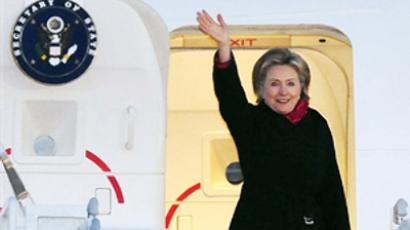First impressions vital as Clinton and Lavrov hold first talks
The first official meeting of the Russian Foreign Minister Sergey Lavrov and US Secretary of State Hillary Clinton has been met with cautious optimism from both sides.
Many in Moscow are hoping a change of face will also come with a change in style.
“Mrs Clinton is certainly a very different personality, she is very experienced politically,” believes Maksim Bratersky, political analyst from the Higher School of Economics.
“She's in away more aristocratic. Condoleezza, with all credits to her, to a certain extent is a very straightforward lady. Mrs Clinton might be more diplomatic,” he said.
Paving the way for top-level meeting
The Kremlin and the White House are talking to one another again. Presidents Dmitry Medvedev and Barack Obama have called each other several times and exchanged letters but according to Medvedev, words are yet to translate into actions.
“I expect that the positive signals that we have received from Washington will be implemented in agreements,” the Russian leader said.
“Anyway, what we have got now shows that our American colleagues and the new president, Barack Obama, want to intensify co-operation and come to a range of agreements of importance not only to Russia and America”.
Fresh from their encounter in Egypt, Lavrov and Clinton have already formed their first impressions of each other. Their task in Geneva is to make sure their bosses can hit the ground running when they meet for the first time at the G20 meeting in April.
Plenty to chew on
For Lavrov and Clinton, the first working dinner together won’t have the romance of Lake Geneva. Nuclear non-proliferation, security in Europe and the fight against terrorism will be a menu difficult to swallow. And while they may agree on the main course, the side dishes are not looking appetising to the Americans.
“I don't think you punish Russia by stopping conversations with them about matters, whether it be the misuse of energy supplies or the failure to comply with the requirements set forth by the OSCE and others concerning their actions in Georgia,” said Hillary Clinton.
“I think that what we have to be is willing to vigorously press the differences that we have while seeking common ground wherever possible”.
Speaking in Brussels on Friday ahead of the meeting, Clinton made comments on NATO’s decision to resume political ties with Russia. She said Washington doesn’t agree that Moscow should have a right to veto the entry of a country to the alliance or the EU.
She also mentioned that co-operation between Russia and the US doesn’t mean Washington won’t support the NATO membership aspirations of Georgia and Ukraine.
The US Secretary of State condemned Russia’s actions in the Caucasus in August last year and the use of energy as a political lever.
Such a crisis appeared to have been averted on Thursday after Gazprom said Ukraine had settled payments.
“We are … troubled by using energy as a tool of intimidation,” Reuters quotes Clinton as saying. “We think that’s not in the interest of creating a better and better functioning energy system.”
Russia’s Foreign Ministry has commented that Moscow is awaiting the Clinton-Lavrov meeting with ‘cautious optimism’ and added that the main goal of the talks is preparation for a Medvedev-Obama meeting.
‘The ball’s in Moscow court’
With Russian-US relations still at a low level, the choice of Geneva as a meeting ground may seem symbolic.
Home to the Red Cross, the city is known for its superb medical professionals. And while analysts agree the US-Russian relations need treatment, their prescriptions vary.
“The US strategic orientation is out of whack anyway, we’re in the Russian neighborhood, they’re not in ours, they’re not in the Western hemisphere, so to speak”, said Dr Ivan Eland from the Independent Institute.
“We need to re-evaluate whether we want to continue to bring former Soviet republics into NATO – and if we can have a little more empathy with Russia it would be good”.
According to Dr James Lewis, director and senior fellow of the Technology and Public Policy Program of CSIS, the US has signalled a willingness to make a few concessions, “but we’ll be looking to see what we get back from the Russians”, he said.
“So now the ball is in Moscow’s court,” he added.
‘How can we trust Americans?’
The former Soviet President Mikhail Gorbachev is concerned that improved relations will only come with renewed trust.
“At present trust between our two countries has been shattered. The Americans are being dishonest. How can we trust them, the Americans? Obama's task is to recreate that spirit of trust.”
“I am optimistic. At first I was a little cautious, but now I think we can talk about the hope that we can formulate an agenda, which will include better dialogue, constant and substantive in nature, creating an atmosphere of trust,” he said.













